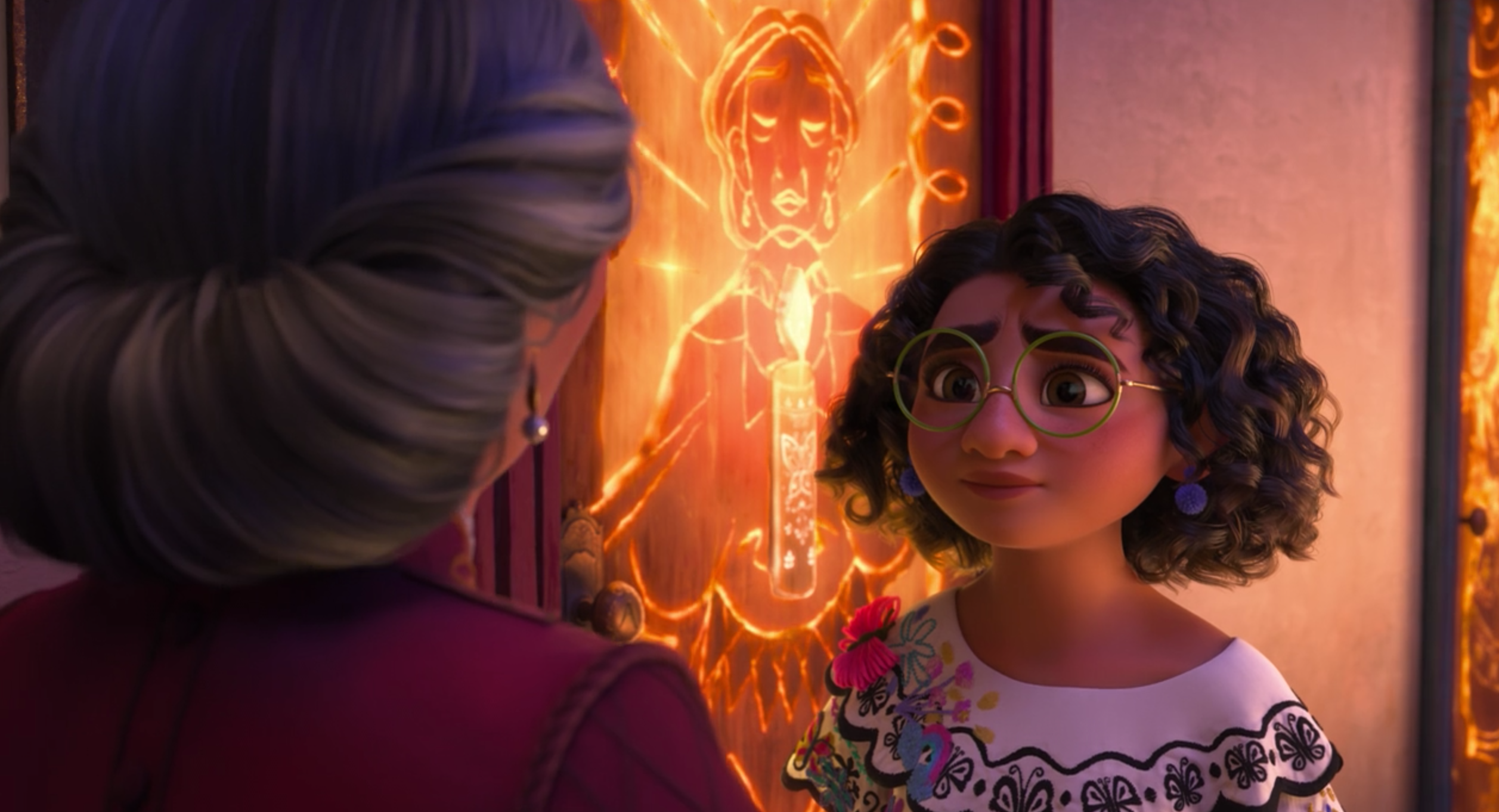**Encanto Spoilers Ahead!**
In a sense, every Disney movie is about being gay. Yes, every last one. But only a few seem to understand otherness on a deeper level, and I’m happy to say that the latest Disney-Pixar miracle Encanto is one of them.
Encanto tells the story of the magical Madrigals, a Colombian family that came into their powers during the Thousand Days’ War, a political struggle in which the conservative national party clashed with the liberal party over the course of three years, causing many families to leave their homes in pursuit of safety. Alma Madrigal fled her hometown with her husband, Pedro, and their three infant triplets. But Pedro tragically falls while protecting his family, and Alma, left with only a candle to light the way toward safety, creates a kind of magical fortress after being imbued with magical powers. Thus casita is born, an enchanted house in which Alma and several generations of magic-infused Madrigals live for the next 50 years. Until one of the youngest Madrigals, Mirabel (Stephanie Beatriz) fails to receive a magic power at her coming-of-age ceremony. And the casita, in turn, starts to crack and lose some of its magic, sending the Madrigal family into fear and chaos.
So many animated films and stories are about kids who are considered different in some way. There’s Belle (“she’s different from the rest of us”) and Ariel (who wants to be on land rather than live under the sea with everyone else) and Elsa (she has magical snow-and-ice powers) and about a million other Disney heroines and heroes who suffer from being a bit too extraordinary. But in Encanto, Mirabel’s problem is that she isn’t special. That is, she’s not special in the way her family has defined it. Everyone else in the family gets magical powers, from Mirabel’s sister Isabela who can grow flowers and cacti wherever she goes and her mother, who can heal wounds with her food. But Mirabel feels left out–she feels like a failure inside her own family, unable to achieve the “perfection” everyone else can.
For a kids movie that came out on Thanksgiving and hit streaming on Christmas Eve, that’s a plot that hits pretty close to home, especially if you happen to be queer and dealing with family struggles over the holidays. And while Mirabel isn’t a canon queer character, her struggle to be accepted by her family is extremely relatable, especially if you’ve ever been the only queer/single/unattached person in your family and are growing tired of being made to feel like a failure for not being able to fulfill the ancestral expectations of propagation or otherwise furthering the family line.
Subscribe to get a twice-weekly dose of queer news, updates, and insights from the INTO team.
in Your Inbox
There are many wonderful things about Mirabel as a character— she’s extremely empathetic, a great problem solver, and has amazing hair and overall style—but by far the best aspect is what out-bisexual actor Stephanie Beatriz brings to the role. “There’s stuff [in Encanto] that feels specifically Bolivian and Colombian, and there’s stuff that feels very much my experience as an immigrant growing up here from the time I was 2,” Beatriz said of the film in an interview with the New York Times. “The thing that I identify with the most about Mirabel is her feeling of not belonging. That’s reflective of my own identity in the United States.” As Mirabel, Beatriz brings a layer of isolation and pain that’s all too familiar to any queer viewer. When she sings her first “I Want” song, “Waiting on a Miracle,” it’s impossible not to read queerness into the lines:
Hey, I’m still a part of the family, Madrigal
And I’m fine, I am totally fine
I will stand on the side as you shine
I’m not fine, I’m not fine
Mirabel isn’t fine: she’s under pressure to not just be perfect, but to be magical. And her family, much as they love her, don’t quite know how to make her feel loved and valuable. Mirabel, on the other hand, tries hard to lift up others when they’re feeling less than immaculate. She helps her sister Isabela grow her powers during a beautiful duet, and helps her other sister, the ultra-strong Luisa, stop prioritizing other peoples’ needs over her own. It’s Mirabel who can heal the family, because she’s the one who has been the most hurt by it. And through Beatriz’s heartfelt, nuanced performance, we can see just how badly she’s been hurt the minute we meet her, as well as how hard she’s trying to keep it all inside.
That’s what makes the beautiful, accepting ending of the story fit so perfectly. Mirabel doesn’t have to have magic powers to be special. She’s the healer, the glue the holds the family together, even after they’ve hurt her so many times. That’s the position so many queer people have been placed in within their families, and Encanto is a beautiful metaphor for how we can encourage our families to make space for us without hurting their sense of tradition or security. All they really have to do is let us in, and the magic happens from there. ♦












